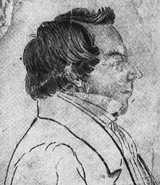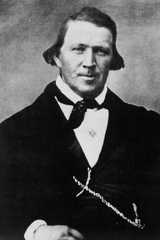The Mormons
 Joseph Smith
Joseph Smith
|
Joseph Smith grew up in western New York and claimed the angel Moroni gave him the golden plates that he translated into the Book of Mormon published in 1830. It told the epic story of migration to America of the light-skinned Nephites and dark-skinned Lamanites and thus provided an explanation for the unique origin of America. Smith continued to have revelations, collected as the Doctrine and Covenants, and became a 19th century prophet for the chosen people who would build the Kingdom of God on earth to prepare for the millennium. The movment attracted small farmers displaced by commercial agriculture and craftsman threatened by the factory system. Mormonism offered security, source of authority, family solidarity, opportunity for the dispossessed. It appealed to Americans who feared the growing chaos of individualism and commercialism and secularism. Due to persecution, Smith and his followers moved to Ohio, then Missouri, then Illinois. From 1839 to 1844, Mormons transformed a swamp along the Mississippi River into a boom town of 10,000, making Nauvoo the largest urban center in the state. Smith planned to create a new form of
 Brigham Young
Brigham Young
|
government and secretly introduced the practice of polygamy during the period, but he was murdered in 1844. Brigham Young emerged as the leader of the main group of Mormons, and began the migration to the Great Salt Lake in 1846.
The success of the Mormons in separating from the existing states and developing a new state called Deseret caused the new Republican Party in 1856 to declare its oppostion to the "twin relics of barbarism, slavery and polygamy." It also caused the Democratic administration of James Buchanan to suppress Mormon state-building by sending an army of 2500 under Albert Sidney Johnston. Brigham Young ordered the evacuation of Salt Lake City before the arrival of Johnston in 1858. No shots were fired and the troops withdrew. When Lincoln was asked what he was going to do, he said "I propose to let them alone."
Links:
revised 2/3/2000 | Civil War seminar